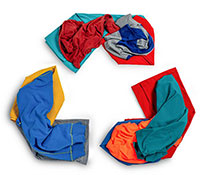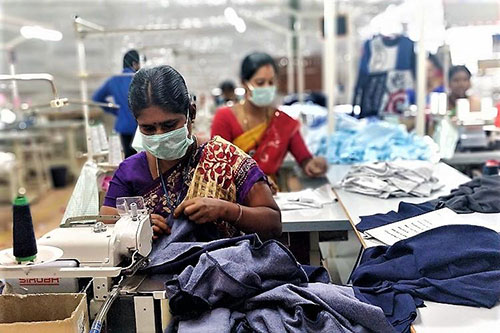"Around 60 per cent of Indian textile industry, projected to grow $223 billion by next few years, is cotton-based. Cotton cultivation consumes around 25 per cent of the world’s pesticides which is fast becoming a major cause of concern for the industry. Textile is the one of the biggest contributors of both dry and wet waste in the industry. Wet processing of textiles generates an enormous quantity of waste sludge and chemically polluted waters. Rising awareness about the challenges is compelling global and Indian brands and manufacturers to adopt the circular fashion movement."
 Around 60 per cent of Indian textile industry, projected to grow $223 billion by next few years, is cotton-based. Cotton cultivation consumes around 25 per cent of the world’s pesticides which is fast becoming a major cause of concern for the industry. Textile is the one of the biggest contributors of both dry and wet waste in the industry. Wet processing of textiles generates an enormous quantity of waste sludge and chemically polluted waters. Rising awareness about the challenges is compelling global and Indian brands and manufacturers to adopt the circular fashion movement.
Around 60 per cent of Indian textile industry, projected to grow $223 billion by next few years, is cotton-based. Cotton cultivation consumes around 25 per cent of the world’s pesticides which is fast becoming a major cause of concern for the industry. Textile is the one of the biggest contributors of both dry and wet waste in the industry. Wet processing of textiles generates an enormous quantity of waste sludge and chemically polluted waters. Rising awareness about the challenges is compelling global and Indian brands and manufacturers to adopt the circular fashion movement.
Leading players are building a global circular fashion industry which not only eliminates substances that cause concern but also increases the durability of clothes, encourages recycling and uses available resources efficiently. This has been achieved through the introduction of many industry-led initiatives such as the Sustainable Apparel Coalition, a group of leading brands, retailers, manufacturers, non-governmental organisations, academic experts, and government organisations who developed the Higg Index.
New technologies, practices for fashion circularity
Local environmental challenges along with the global adoption of the principles of have brought Indian leaders on the brink of circular innovation. Organisations are experimenting and innovating towards the circular textile economy goals. New emerging start ups are inspiring the introduction of new technologies and business practices. For instance, Mumbai-based Boheco is reducing and replacing the use of cotton in textiles with hemp fiber. Similarly Chennai-based Trustrace is using blockchain technology to improve transparency and traceability in the supply chain. Two other start-ups Lionise and Kiabza are experimenting with new retail models of rental and second-hand clothing respectively.
innovation. Organisations are experimenting and innovating towards the circular textile economy goals. New emerging start ups are inspiring the introduction of new technologies and business practices. For instance, Mumbai-based Boheco is reducing and replacing the use of cotton in textiles with hemp fiber. Similarly Chennai-based Trustrace is using blockchain technology to improve transparency and traceability in the supply chain. Two other start-ups Lionise and Kiabza are experimenting with new retail models of rental and second-hand clothing respectively.
Startups and stakeholders complement each other
Partnerships between stakeholders and startups are becoming common as corporations require large-scale organisational innovation to make an impact, while startups are agile and can respond to challenges with individual or small scale innovation.
Collaborations between the startups and corporations are becoming popular for the impact they have on the circularity agenda of these brands. Enablers are now identifying and driving ‘unlikely alliances’ between the two. The circularity movement is thus influencing the textile industry in a big way and is likely to shape its entire core value system in the next few years.












